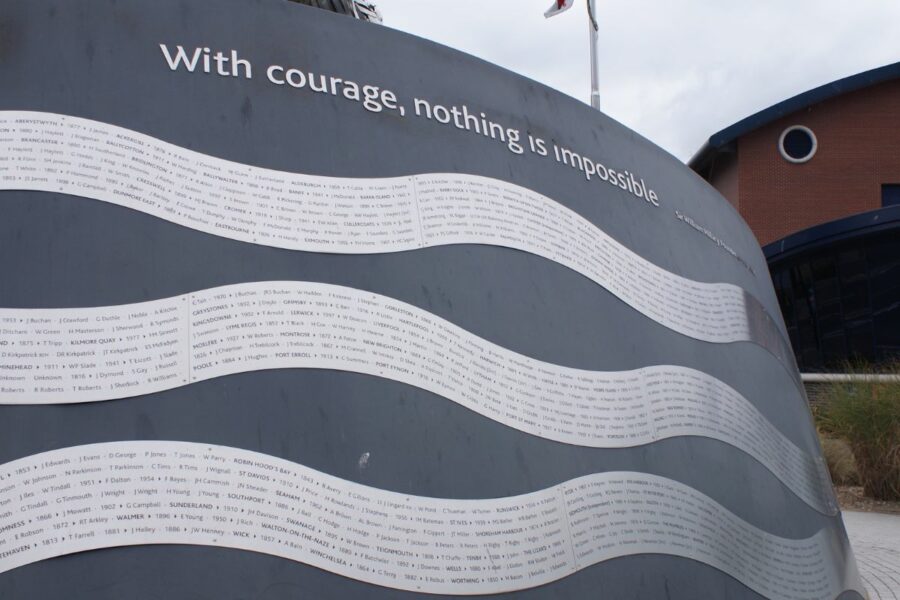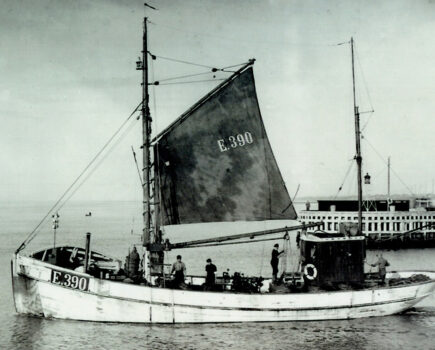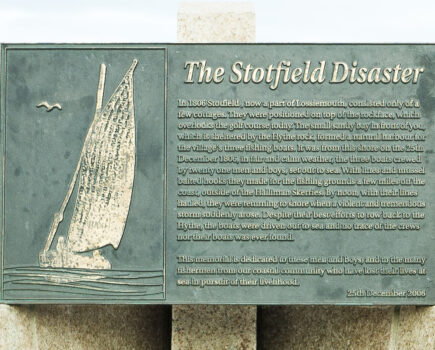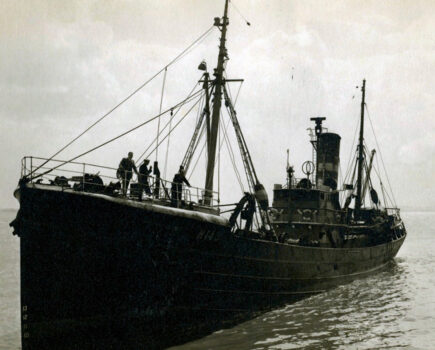While families were relaxing on Christmas Day 1956, the crew of the Exmouth lifeboat were facing a tragic ordeal. Mark Blanchard reports…
The South Devon town of Exmouth, with its small commercial docks and fishing community, forms the gateway to the shipping port of Exeter further inland.
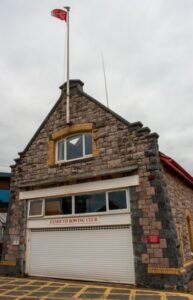
The original Exmouth lifeboat station where the Maria Noble was housed – now the headquarters of Exmouth Rowing Club.
Mid-afternoon on 25 December, 1956, the Amsterdam vessel MV Minerva was in trouble – she was spotted four miles southeast of Orcombe Point, firing distress rockets. The wind was blowing force six to eight, and had been for a while, allowing a large swell to build. Waves were over 20ft high.
At 5.15pm, the town’s lifeboat Maria Noble was launched and started battling towards the ship. After just 15 minutes, a large wave hit the Maria Noble, pushing her right over on her side, damaging the radio aerial and losing communication with the shore.
Minutes later, 53-year-old crewman Will Carder, landlord of the Volunteer pub in Exmouth, told the bowman he was going aft for some shelter. Crewman Brian Rowsell, a local fisherman and boatbuilder, was meanwhile attempting to repair the damaged aerial.
Another huge wave struck. Will Carder was washed overboard without trace, and Brian Rowsell was swept into the mast and sustained a severe head injury.
Very shortly after, another enormous wave crashed aboard, washing second coxswain Jack Philips overboard and sweeping him out of sight.
Coxswain Harold Bradford, holder of the RNLI bronze medal for gallantry, was left with a horrendous decision: attempt to turn the lifeboat around in such atrocious conditions and risk losing all the crew, or head on towards the casualty. He made the decision to head on.
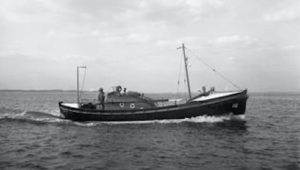
The Maria Noble was in service at Exmouth from 1953 to 1960.
As the Maria Noble was a non-self-righting Liverpool-class lifeboat, Harold Bradford and his crew knew all too well the likelihood of the vessel capsizing in such a heavy sea.
The radio operator managed to make contact on a fishing channel, and the lifeboat’s plight was relayed to the shore.
Coastguards sent out search parties along the coast where the two missing men were likely to wash in. Second coxswain Jack Philips was found struggling in the surf. He was helped ashore and taken to hospital. Sadly, Will Carder’s body was later found near the same spot.
The Maria Noble reached the Minerva at 6.45pm. She was in a poor way, with engine failure and dragging her anchors. The Maria Noble stood by, her crew in shock after their devastating ordeal. At 8pm, the Torbay lifeboat George Shee relieved the Maria Noble and took over the rescue.
Conditions had deteriorated so much that the Maria Noble was unable to return to Exmouth due to the height of the breaking swell, so she steamed to the safety of Torquay harbour. Brian Rowsell was taken to hospital for treatment, and made a full recovery from his head injury.
The exhausted crew stayed in Torquay until mid-afternoon on Boxing Day. Returning home, they found a town in mourning and the RNLI flag flying at half mast.
Following this tragedy, Trinity House requested that serving pilots resign from services to the RNLI. Coxswain Harold Bradford, second coxswain Jack Philips and Cecil Hockings all stood down as a result.
Will Carder’s father was awarded an allowance from the RNLI.
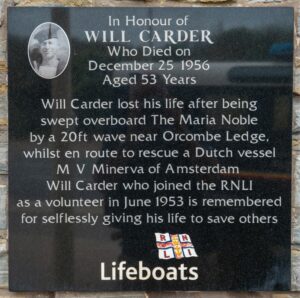
The plaque on Exmouth’s new lifeboat station commemorating RNLI crewman Will Carder.
Brian Rowsell and two of his brothers, Peter and Martin, had started out as fishermen with their father Frank in his 25ft Dixon boat Olive Branch, which Frank called ‘My Little Oliver’. They worked together, trammel netting in winter for plaice, brill and turbot, and working top nets in summer for bass and mullet. They even towed small scallop dredges.
All three brothers stayed with the sea throughout their careers. Martin Rowsell went to work in the merchant navy, rising to become a captain. From 1971 to 1994, he was employed as a pilot in the port of Poole, docking cross-Channel ferries and other shipping. A plaque built into the wall of the new pilot station on Poole quay recognises his outstanding skill and service.
Peter ‘Spud’ Rowsell joined the crew of Exmouth lifeboat and completed 20 years’ service. He set up a boatbuilding company and became a renowned racing dinghy sailor, winning several national championships in the high-speed ‘Merlin Rocket’ class.
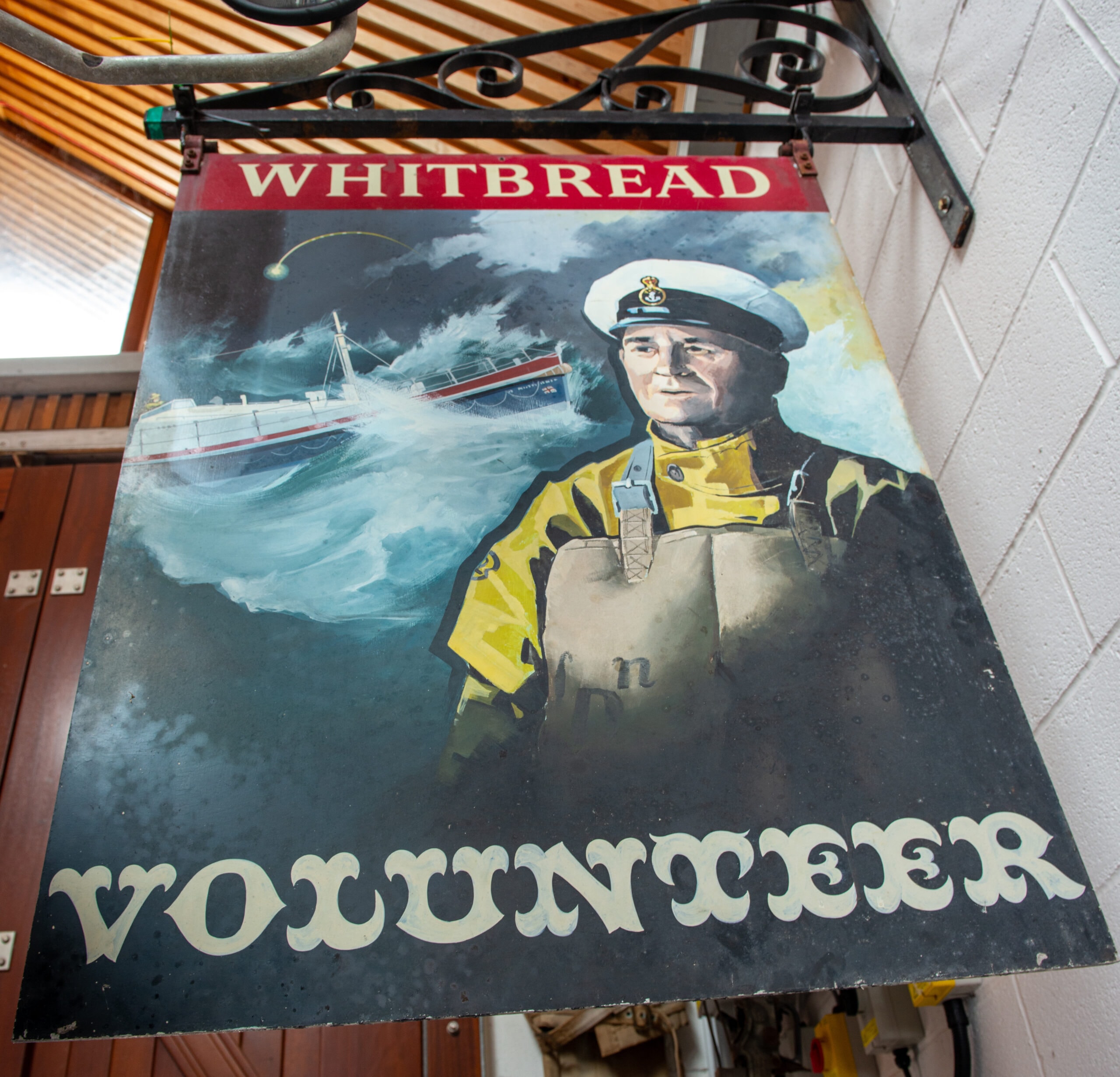
The pub sign at the Volunteer, where Will Carder was landlord.
He wrote an autobiography, Living My Dreams, and had it published earlier this year, shortly before he passed away. Peter’s son, another Frank, runs a successful sailmaking business in Exmouth.
Brian Rowsell carried on fishing and bought his own boat, the Nil Desperandum. During national service in the Royal Navy, he was spotted dinghy sailing by a senior officer and given an Olympic trial. Brian preferred heavier craft, but put his masterful boatmanship down to sailing cadet dinghies, and to learning to handle a small boat while mullet-netting when he was young.
Ten years after the Christmas Day tragedy, Brian Rowsell was involved in another rescue with large breaking swells.
On 29 May, 1966, police reported to the RNLI that there were swimmers in difficulty two miles southwest of Exmouth in the shallows off Dawlish Warren.
Brian and his brother Peter launched the inshore rescue boat. There had been an easterly gale earlier in the day, and once outside the lee, they met some challenging swell; a large wave broke just before them and washed them both straight out of the boat.
They managed to get back aboard and restart the engine, reaching the casualties in less than 10 minutes from launching.
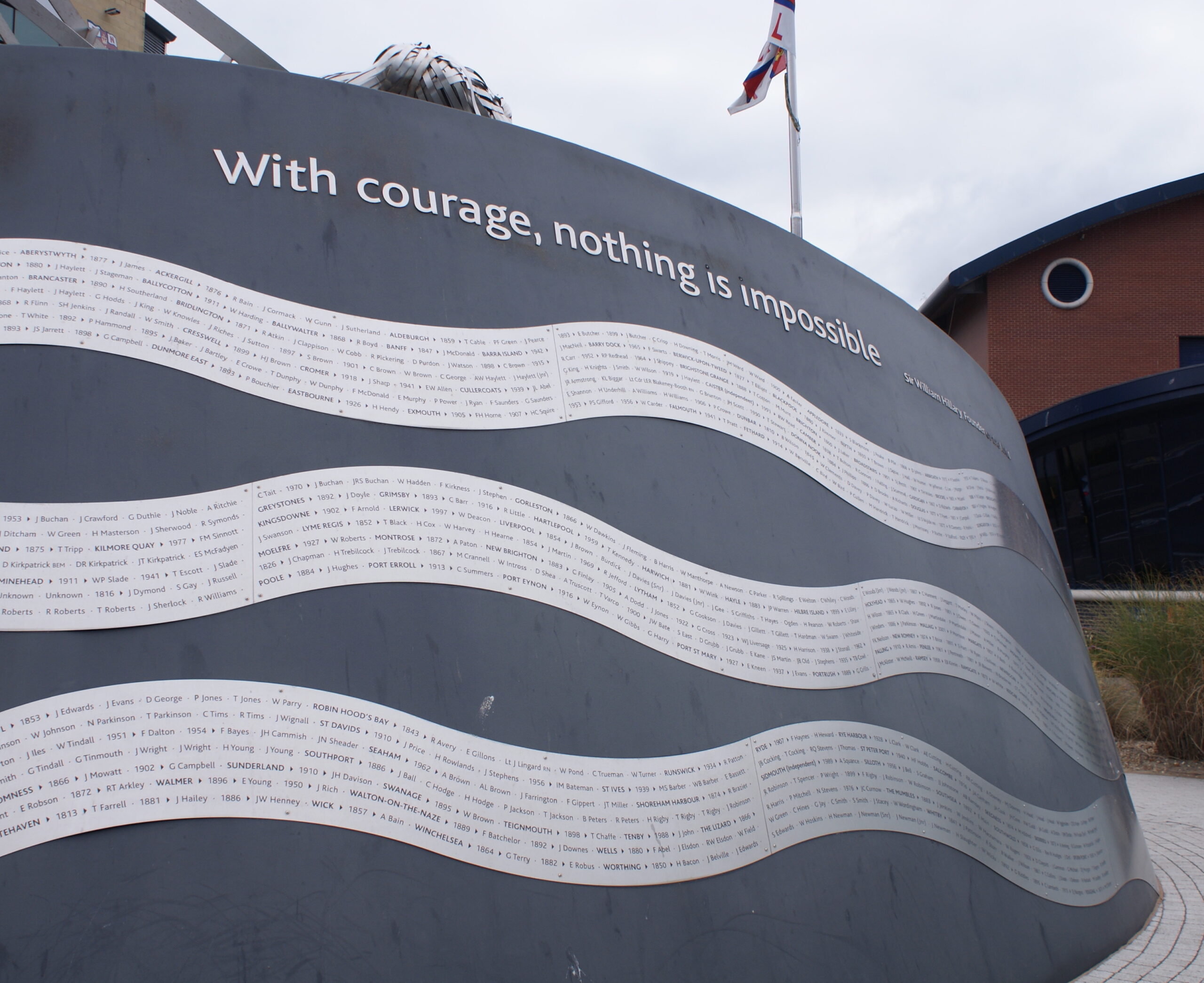
The memorial sculpture to lifeboatmen lost in service at the RNLI headquarters in Poole, on which Will Carder’s name appears.
They rescued three swimmers who were all in need of urgent medical attention, and raced back to the beach to meet an ambulance.
The brothers then discovered that there had been a fourth swimmer so, without hesitation, went back to search. On the way out, the boat hit another giant swell, throwing Brian out again. Peter, who was helming, got him back aboard.
They were joined in the search by the Exmouth lifeboat and a helicopter, but sadly no further survivors were found.
The RNLI accorded both Brian and Peter Rowsell the ‘Thanks of the Institution on Vellum’ for their part in the rescue.
In addition to being an accomplished commercial fisherman and boatbuilder, Brian Rowsell also served as a pilot at the port of Exmouth.
His RNLI career lasted over 30 years, rising to second coxswain and then coxswain at Exmouth. He passed away in 2013, aged 81.
This story was taken from the archives of Fishing News. For more up-to-date and in-depth reports on the UK and Irish commercial fishing sector, subscribe to Fishing News here or buy the latest single issue for just £3.30 here.

